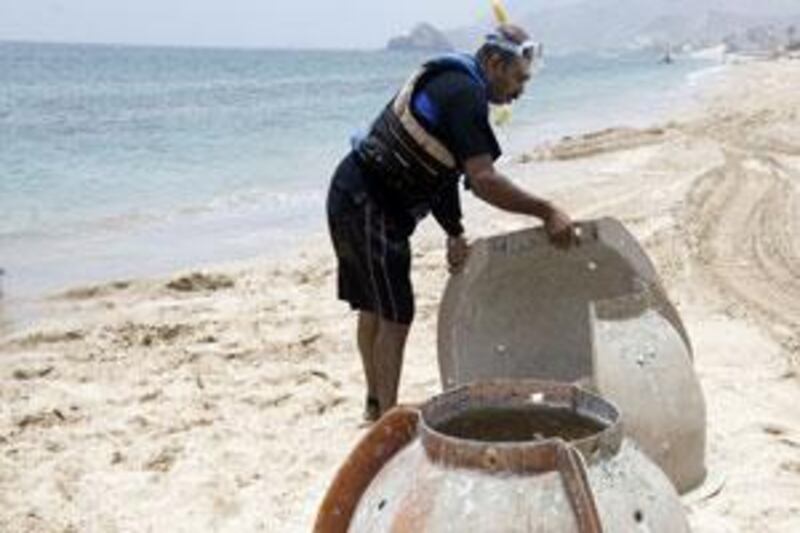DIBBA // To help sea life recover from a difficult year, a hotel has laid the foundations of a new artificial reef in the waters of Fujairah. More than a dozen so-called reef balls were dunked into the sea near Le Méridian Al Aqah Beach Resort near Dibba on Sunday, and around 40 are expected to be in place by the end of the summer.
Reef balls are hollow, moulded blocks of concrete that provide a shelter in which coral and plants can grow, in turn attracting fish. Although they have been used in Dubai and in other parts of the world, this is the first time they have been used to start an entirely artificial reef on the east coast. Having been placed on the beach at low tide by a crane early in the morning, divers used inflatable bags to raise the balls once the sea had covered them.
They were then dragged by boat to their resting place around 500 metres offshore. "We have been looking to create an underwater habitat for a while, planning to sink interesting things like boats and a plane, but it is quite difficult to get hold of this stuff and make it safe and environmentally friendly, so while we are still working on that we thought we would start off with the tried and tested reef balls," said Patrick Antaki, the general manager of the hotel.
"The UAE is never going to be a dive destination in the way that the Red Sea or the Great Barrier Reef are, but is more a holiday destination where people can dive - I don't think this reef will bring more tourists, but it will make the experience richer for people coming here." The first of the reef balls, which cost around Dh1,000 (US$270) each to make and install, were put in 15 metres of water, but the hotel also intends to put some in shallower water for snorkelers.
Last year, much of the east coast was badly affected for several months by red tide, an algae bloom that sucks oxygen out of the water, killing marine life, and reducing visibility so that recreational diving becomes almost impossible. Mr Antaki said it reduced visitor numbers and would have had a severe effect on the industry if it had continued much longer. "With the internet, if you get too many comments on sites like Trip Advisor saying the sea is bad then people will stop coming - we were lucky that the red tide went when it did," he said.
"I've seen it come and go very quickly, and nobody can tell me scientifically what causes it. One day it was there, and then we had four or five days of rain and it was just gone - I don't mean there was some left at the bottom of the sea or in isolated patches, it was just completely gone. It seems to happen after there has been a cyclone in the region, so it may be part of a natural cycle, but nobody really knows."
Hassan al Yamhi, the director of Dibba Municipality, said the creation of artificial reefs was helping the authorities gain experience in how to regenerate an area after it had been hit by red tide or oil spills and other pollution. "Already the area affected by red tide is growing back - it seems to us that it may have actually brought new life, because divers are saying there are new species coming in that were not here before," he said.
"Traditionally people from Dibba have worked in agriculture and fishing, but in the last six years there has also been a tourist boom. Projects like this will help tourism, but it is more about the environment - it is about helping create new marine life in new areas." Simon Tambling is the managing partner at Al Boom Diving, which has a dive centre at the hotel and is carrying out the operation to install the artificial reef.
"The biggest problem is the limited number of dive sites in the UAE - there are around half a dozen on the east coast and once people have dived them a few times they are not as keen to go any more," he said. gmccllenaghan@thenational.ae






